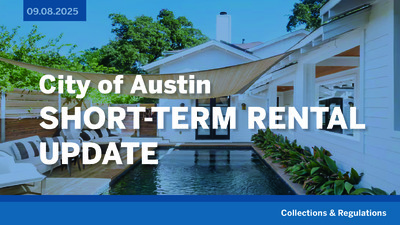Item 7 Backup Short Term Rentals — original pdf
Backup

09.08.2025 City of Austin SHORT-TERM RENTAL UPDATE Collections & Regulations Unlicensed STRs Around 80% of Austin’s STRs are unlicensed, which has led to issues with regulation and collection of the City portion of Hotel Occupancy Taxes. This year the City of Austin began to implement efforts to collect HOT and improve regulation. HOT Collection Previously, only the operators of licensed STRs were collecting and remitting HOT to the City. As of April 1, 2025, the city requires requiring platforms such as Airbnb and Vrbo to automate collect and remit Hotel Occupancy Tax revenues on behalf of STR properties, and remit to the City. Regulation updates In February 2025, City staff introduced detailed new regulations, and processes for bringing unlicensed STRs into compliance. Council vote and implementation was delayed by legislative action. City Council will now vote on new regulations on September 11, 2025, to go into effect on Oct 1 • Each operator must designate a local contact who be present at the short-term rental within two hours if requested by a City employee. • Noise and other neighbor complaints may lead to fines and denial of license renewal Density caps are meant to limit STR proliferation in areas prone to gentrification • If an individual owns more than one STR, the STRs must be at least 1000 feet apart unless the STRs are located in a multi-family site • On a site with four or more dwelling units, an owner may operate the greater of one or 25% of the units Regulation changes since Feb. • The appeals process for operators has been shortened and removes review by the Building & Standards Commission • While an appeal is pending, operators may still host bookings accepted before license revocation • Intent-to-revoke process now includes pre- revocation conference and compliance plan Resident Concerns • Short term rentals replace housing, especially affordable units • The density caps are not extensive enough to prevent proliferation of corporate STRs • Regulation is not sufficiently stringent to protect neighbors from noise, nuisance, and crime.